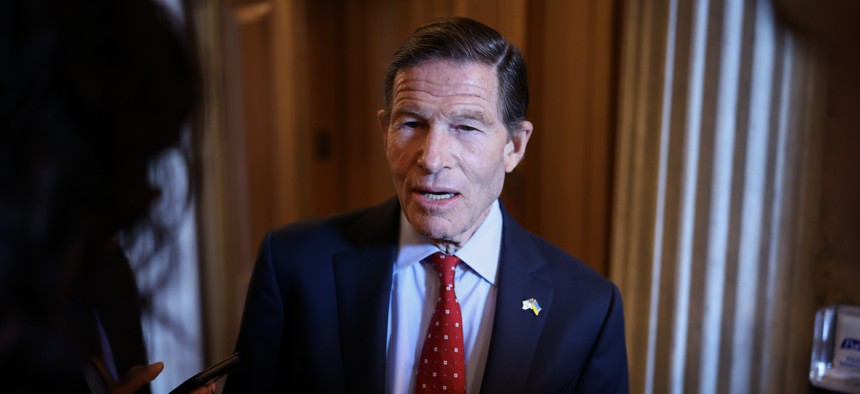
Sen. Richard Blumenthal, D-Conn., co-sponsored the Servicemembers and Veterans Empowerment and Support Act to expand access to care for sexual trauma experienced during military service. Kayla Bartkowski / Getty Images
New legislation aims to increase access to VA sexual trauma care
Congress has paid increased attention to sexual misconduct at the military academies following revelations about mishandled cases at the Coast Guard Academy.
A bipartisan, bicameral trio on Thursday introduced legislation to improve access to Veterans Affairs Department healthcare for sexual trauma experienced during military service.
The measure, dubbed the Servicemembers and Veterans Empowerment and Support Act, is partly the result of congressional investigations into the Coast Guard’s coverup of Operation Fouled Anchor — a multi-year review of generally mishandled sexual assault allegations at the Coast Guard Academy from the late 1980s to 2006.
“Survivors of military sexual trauma have endured unimaginable pain and deserve the highest quality care and services,” said Senate Veterans’ Affairs Committee ranking member Richard Blumenthal, D-Conn., in a statement. “They should have clear access to every tool needed to heal from their trauma. Our bipartisan bill will afford survivors a stronger voice in filing claims and expand VA treatment.”
Blumenthal, who led the Senate investigation into Operation Fouled Anchor, co-sponsored the bill with Sen. Lisa Murkowski, R-Alaska, and Rep. Chellie Pingree, D-Maine.
Their measure would:
- Require the military service academies to provide individuals who withdraw from the schools with information on their potential eligibility for VA care related to military sexual trauma and the option to receive copies of records related to such trauma.
- Direct the VA, when evaluating claims involving such trauma, to consider nonmilitary sources of evidence, such as law enforcement records and statements from family members and friends.
- Mandate that specialized teams review and process such claims regarding a link between military sexual trauma and mental health conditions.
The legislation is backed by several groups, including the Veterans of Foreign Wars, Wounded Warrior Project and Paralyzed Veterans of America.
“VA offers benefits and healthcare to veterans who have experienced military sexual trauma, but survivors often encounter barriers in accessing these necessary services,” said PVA Chief Policy Officer Heather Ansley in a statement. “The Servicemembers and Veterans Empowerment and Support (SAVES) Act would improve the claims process, codify evidentiary support and increase access to mental health care for MST survivors.”
The Defense Department reported that in fiscal 2023 6.8% of active duty women and 1.3% of active duty men reported experiencing unwanted sexual contact in the previous year. In March, DOD found that 457 academy women and 327 academy men experienced some form of such contact during the 2023-2024 academic program year.







